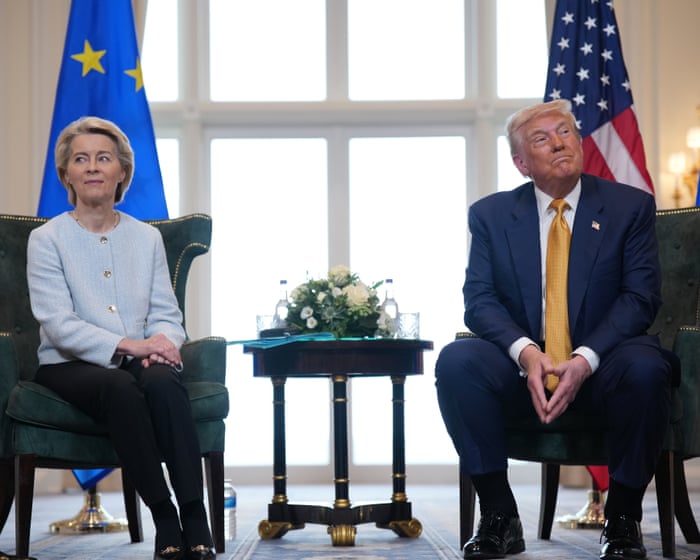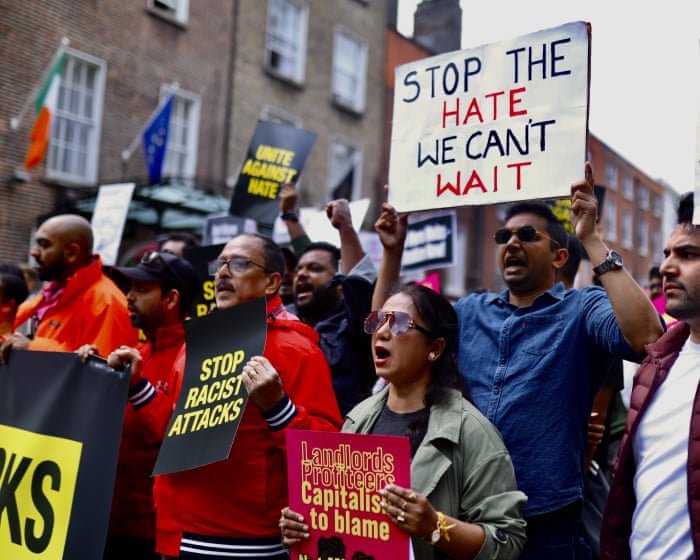Remember those tongue-in-cheek “introduction videos” that went viral during Trump’s first term—the ones meant to humorously explain European countries to him? It all started with Dutch comedian Arjen Lubach, who ended his clip about the Netherlands by saying, “We get that it’s America first, but can we at least be second?” Turns out Europe’s leaders took those jokes a little too seriously.
Instead of standing firm in trade talks with Trump, the EU folded before the game even began. Rather than pursuing strategic independence, it pledged to spend hundreds of billions on American weapons. Instead of pushing climate goals, it committed to buying vast amounts of US natural gas. Rather than negotiating mutual tariff cuts, it accepted a one-sided blow to EU exporters. And in place of self-respect? A humiliating surrender.
The so-called “deal” Trump struck with Ursula von der Leyen last month raises endless questions. Why does the EU—an economic giant—act like a timid mouse? Why settle for nibbling at the edges of power? Why doesn’t it demand respect like China, which matched Trump’s tariffs until he backed down? Why don’t European politicians realize voters reward leaders who fight for them—just look at Canada’s Mark Carney or Brazil’s Lula? And why, even after Brexit, do they still ignore that voters care more about identity and emotion than cold economic logic?
The EU had leverage—it just lacked the nerve. As Macron pointed out, Europe isn’t “feared enough.” Yet it holds more economic power over the US than China does. With its anti-coercion tools, the EU could cripple America’s advanced semiconductor industry by cutting off exports, turning Trump’s $500 billion AI project into a pipe dream. It could dismantle Silicon Valley’s dominance by taxing tech giants, blocking their market access, and stripping their intellectual property protections. For good measure, it could even disrupt America’s supply of drugs like Ozempic.
Would this escalate? Absolutely. But as the weaker tech player, the EU has less to lose—and more to gain. Europeans already despise Trump, and a trade war might actually unite them, while Americans—half of whom hate him too—wouldn’t rally behind him.
We underestimate the simmering frustration in Europe. The first leader who publicly tells Trump where to shove it—bluntly and unapologetically—will ride a wave of unprecedented public support.
Is this unrealistic? Maybe. But so is everything about Trump. Why do we accept shocking behavior from the US but never expect it from ourselves? By surrendering, Europe confirmed Trump’s belief that it’s weak and easily manipulated. Now he’ll keep coming back for more—like US Commerce Secretary Howard Lutnick, already targeting EU tech regulations post-deal.
The world has changed. Russia, China, and the US all want spheres of influence where power, not rules, dictates outcomes—they just differ in how much chaos (Russia) or stability (China) they prefer. Trump excels at weaponizing emotion, but he’s also deeply predictable. Europe just has to decide: Will it keep playing the mouse, or finally start acting like the lion it is?The EU stands as the last major force deeply committed to a world governed by the rule of law. While other nations like the UK, Australia, New Zealand, South Korea, Japan, and potentially Brazil (especially on climate issues) share this goal, Europe has long been captivated by America’s narrative—now a darker, more troubling story under Trump. This leaves Europe in a precarious position, both economically and geopolitically. Its reliance on the U.S. and fear of Trump abandoning Ukraine expose its hypocrisy: unwilling to enforce international law against Netanyahu’s actions in Gaza while rightly condemning Putin’s attacks on Ukrainian civilians.
Europe now faces a critical moment. Will it remain stuck in half-measures, internal divisions, and endless compromise? The far-right offers one answer: dismantling the union, reducing Europe to infighting and global irrelevance. But what’s the alternative for those who believe in a united Europe?
The EU must start believing in itself—not in America’s spin. That means rethinking prosperity beyond GDP, integrating climate concerns into every economic decision, and reshaping global trade around carbon pricing, using the EU’s emissions trading system as a foundation. It means funding itself through a common corporate tax, wealth taxes, and tech levies, silencing far-right complaints about “sending money to Brussels.” It means spending boldly—whether on tech, space, or other strategic areas—because Europe’s shortcomings often stem from its reluctance to invest. NASA’s budget dwarfs the European Space Agency’s; why shouldn’t Europe match that ambition?
Finally, the EU should borrow one thing from Trump: caring less. If critics attack, respond with confidence. A von der Leyen spokesperson might even say: “She may not be the best negotiator, but at least she’s not a felon or a predator.”
The choice is clear—either Europe acts with conviction or fades into irrelevance.
Alexander Hurst is a Guardian Europe columnist



